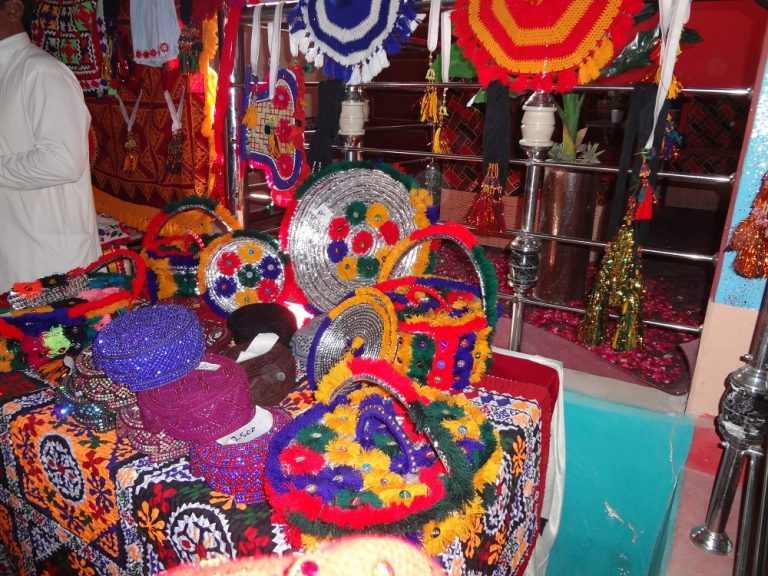
Potential alternative is available if the government, concerned departments and non-governmental entities join hands to explore, promote and adopt these traditional products.
By Fahad Rind
The use of plastic bags is drastically increasing in Pakistan where according to data 60 billion plastic bags are used annually. As a result, we are heading toward a deplorable state where the lakes, coastline, rivers and entire sewerage system has fallen victim to it. The people have been throwing the used plastic bags at all the places and one can see huge heaps of such bags everywhere that has created severe pollution problems.
Sindh government’s ban on polythene use is being openly flouted. Besides lack of political will on the part of government machinery, lack of awareness among general public and the unavailability of affordable alternatives in the market are the main reasons for not abandoning the use of plastic bags or polythene. However potential alternative is available if the government and related departments and non-governmental entities explore, promote and join hands to adopt these. One of such high potential alternatives is to promote traditional handicrafts by training, subsidizing the artisans to produce and value add their products for packing and different other use to replace ubiquitous plastic or polythene made products.
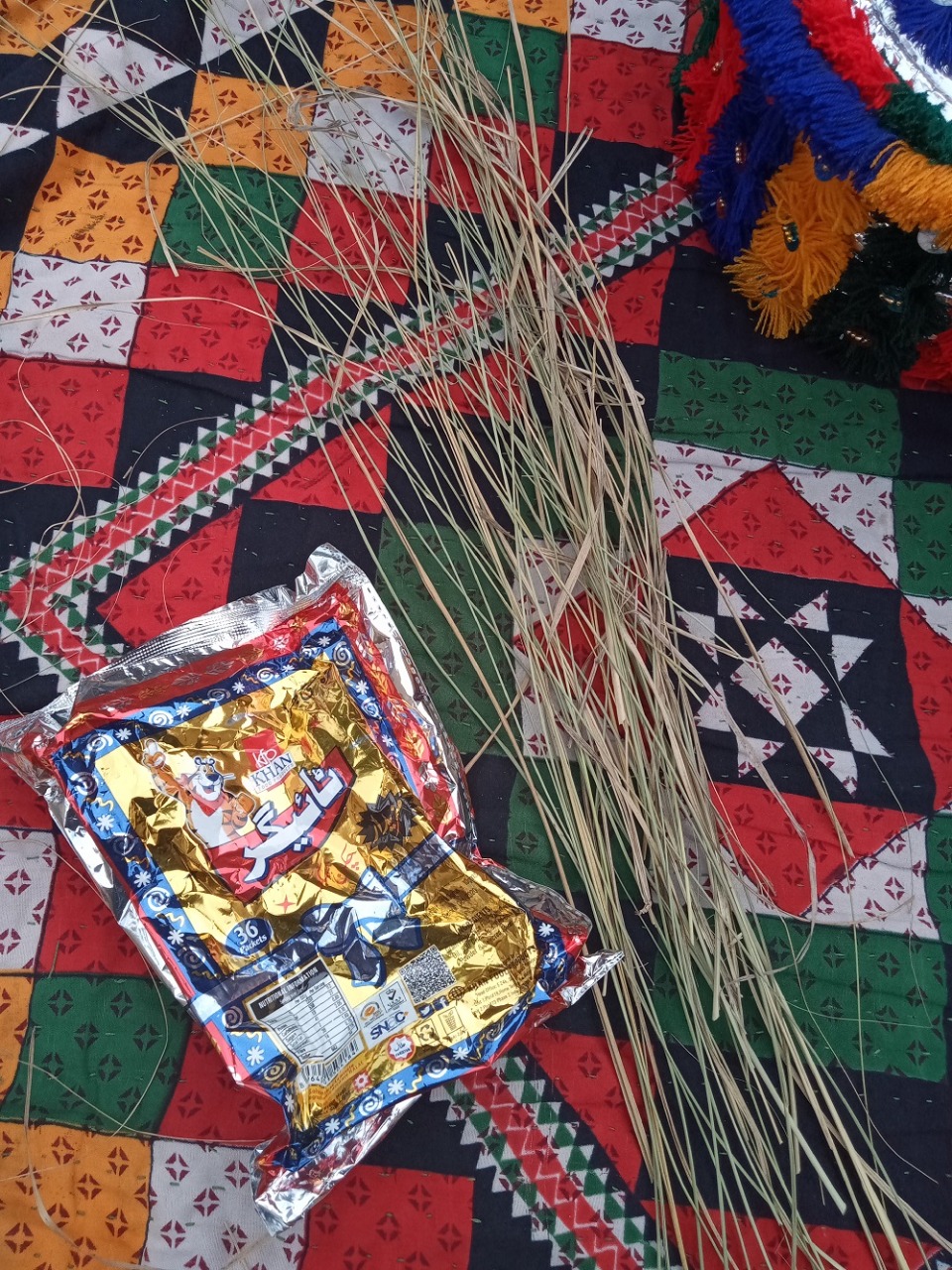 As Sindh is culturally rich, many of its cultural products have won the hearts of people around the world. There is no exaggeration to say that the culture of the Sindh has its own unique identity in the world be it Sindhi Ajrak, Topi (hat) or glazed ceramic, earthenware and terracotta. The indigenous people across the province are engaged for years in making handmade cultural products from raw materials like straw, clay and cotton to endure their culture. Amid exceeding use of plastic wrappers in the packing and packaging of products like confectionery chips, chocolates and sweets many rural villages of Pakistan, particularly of Sindh are infected in plastic. Be it water ponds, cultivated or uncultivated land it can be seen covered with plastic bags and bottles. It would be almost impossible to find a single house not using plastic bags in Pakistan and not a single child who is not purchasing confectionery covered with plastic wrappers. There are thousands of women who are working on different kinds of handicrafts that can be a good replacement for plastic use.
As Sindh is culturally rich, many of its cultural products have won the hearts of people around the world. There is no exaggeration to say that the culture of the Sindh has its own unique identity in the world be it Sindhi Ajrak, Topi (hat) or glazed ceramic, earthenware and terracotta. The indigenous people across the province are engaged for years in making handmade cultural products from raw materials like straw, clay and cotton to endure their culture. Amid exceeding use of plastic wrappers in the packing and packaging of products like confectionery chips, chocolates and sweets many rural villages of Pakistan, particularly of Sindh are infected in plastic. Be it water ponds, cultivated or uncultivated land it can be seen covered with plastic bags and bottles. It would be almost impossible to find a single house not using plastic bags in Pakistan and not a single child who is not purchasing confectionery covered with plastic wrappers. There are thousands of women who are working on different kinds of handicrafts that can be a good replacement for plastic use.
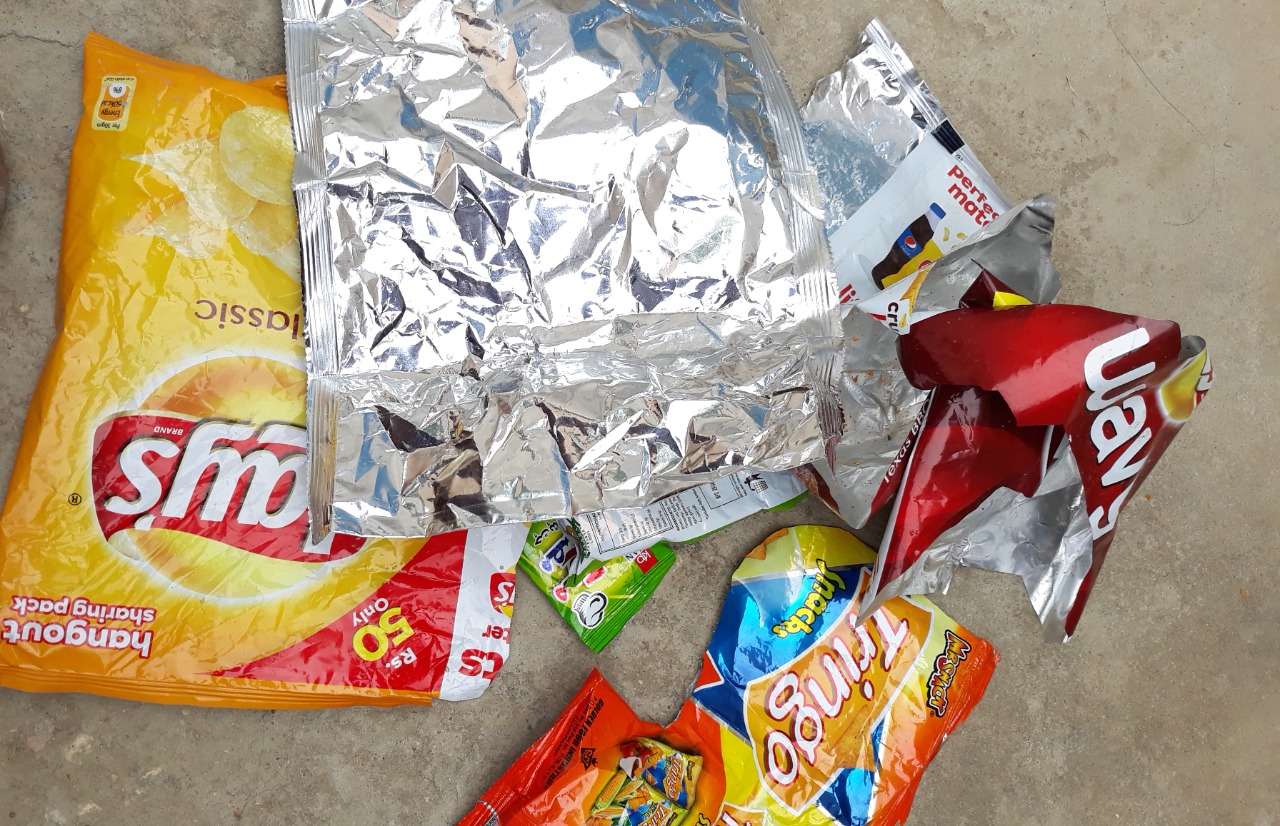 One such woman from a small village Kamal Khan in Johi tehsil of Dadu District is an artisan of straw work which she gained from her ancestors. She is making various types of handicrafts from straws of wheat, date, and rice in which all crafts are hand-woven including baskets, bread pot, hot pot for bread, vase, hand fan and a few more products, and after furnishing and finishing, all the products are being marketed to the nearest market to sell at a very low price.
One such woman from a small village Kamal Khan in Johi tehsil of Dadu District is an artisan of straw work which she gained from her ancestors. She is making various types of handicrafts from straws of wheat, date, and rice in which all crafts are hand-woven including baskets, bread pot, hot pot for bread, vase, hand fan and a few more products, and after furnishing and finishing, all the products are being marketed to the nearest market to sell at a very low price.
Ms Yasmin an artisan of straw work is a member of the Community Organization (CO) Emaan formed by the Thardeep Rural Development Programme under Sindh Union Council and Community Economic Strengthening Support (SUCCESS) Programme funded by the European Union. She is working for the betterment of the community and elimination of poverty in her union council since 2017.
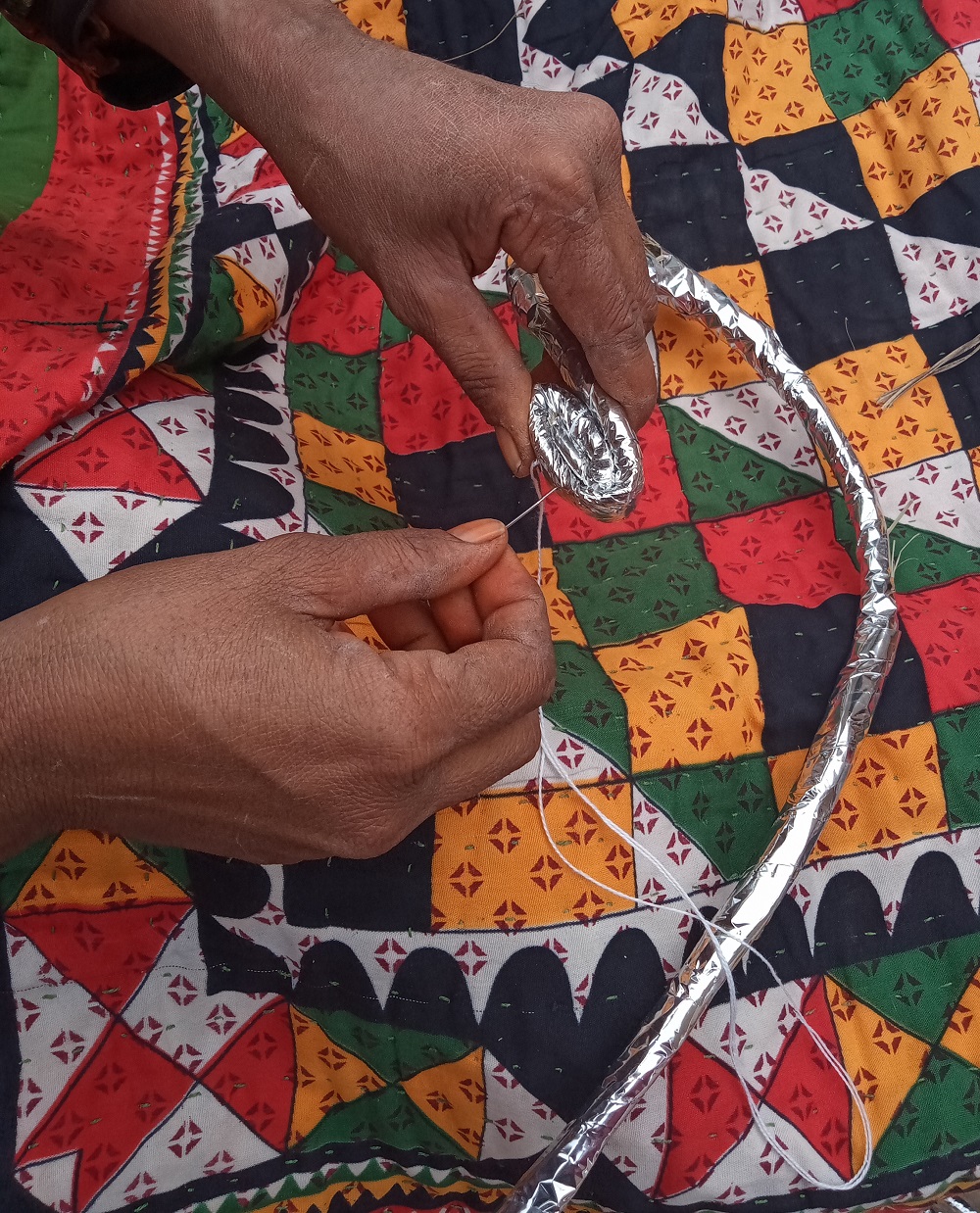 While talking to this scribe she said, “I am curious to learn and contribute to the betterment of the environment where we live-in.” She thinks a bit different from the rest of the women since her childhood and was in quest of an opportunity to express her ideas and finally, her wait came to end when a social development organization initiated a long term programme in her village.
While talking to this scribe she said, “I am curious to learn and contribute to the betterment of the environment where we live-in.” She thinks a bit different from the rest of the women since her childhood and was in quest of an opportunity to express her ideas and finally, her wait came to end when a social development organization initiated a long term programme in her village.
It was a cold morning when she was invited to participate in three-day community management skills training where she was sensitized and mobilized by Thardeep Rural Development Programme’s team to find ways to mobilize existing resources to get rid of the curse of poverty, social and existing environmental issues and that event created a realization in her that she has to contribute to bringing a positive change in the society.
She collects wrappers that are being thrown by children after unpacking sweets, chips, Nimkos and other confectionary items, and after making them all well clean, she turns the upside down and wraps each stick/straw of hand-made crafts. As the backside of most wrappers is shining, glowing and consisting of rainbow colours which directly adorn the products of the artisan and gives an attractive and shiny look to the products.
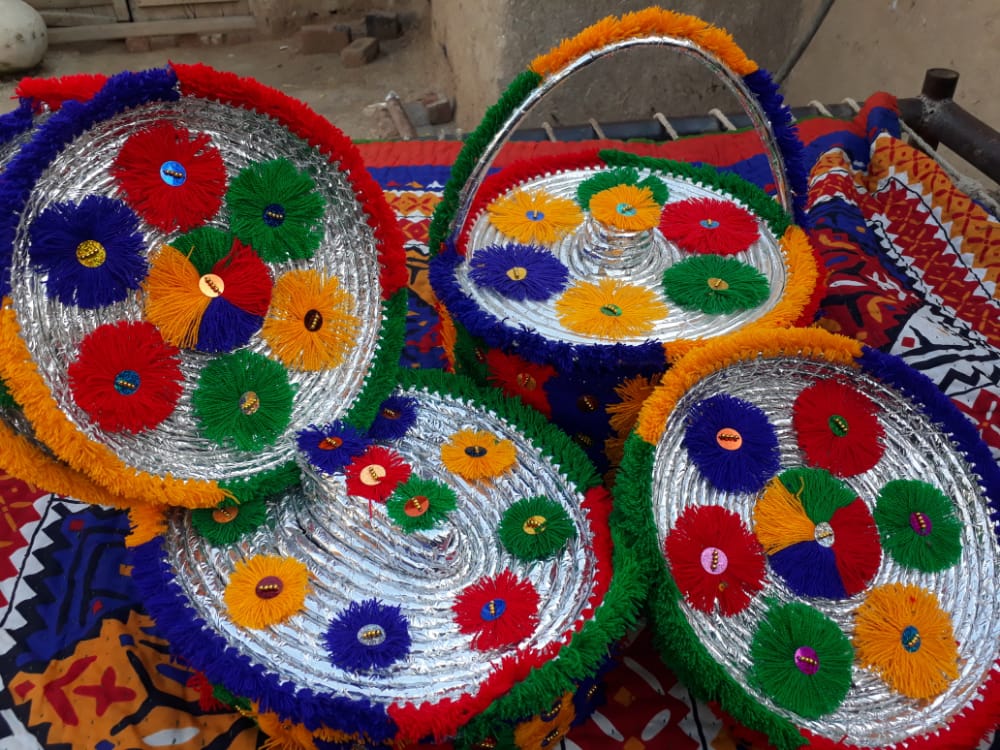 Ms Moomal Mallah, Capacity Building Officer from Thardeep Rural Development Programme (TRDP) Johi says, “During the formation of Community Organization (CO), she saw Yasmin’s work and found it different, innovative and environment-friendly. She had never seen such eye-catching work in her career in the field of the development sector. She vowed to promote her work from the platform of TRDP. First-time hand-made items made from straws of wheat covered with wrappers were displayed at an exhibition workshop in johi for sell and all items sold easily because of attractive look and shine. Later the items were displayed by TRDP’s team at HUNARMAND MELA organized by Sindh Indigenous and Traditional Crafts Company (SITCO) at Hyderabad Museum and Art Council Karachi where the products got the attention of people from different walks of life, many of them ordered as well.
Ms Moomal Mallah, Capacity Building Officer from Thardeep Rural Development Programme (TRDP) Johi says, “During the formation of Community Organization (CO), she saw Yasmin’s work and found it different, innovative and environment-friendly. She had never seen such eye-catching work in her career in the field of the development sector. She vowed to promote her work from the platform of TRDP. First-time hand-made items made from straws of wheat covered with wrappers were displayed at an exhibition workshop in johi for sell and all items sold easily because of attractive look and shine. Later the items were displayed by TRDP’s team at HUNARMAND MELA organized by Sindh Indigenous and Traditional Crafts Company (SITCO) at Hyderabad Museum and Art Council Karachi where the products got the attention of people from different walks of life, many of them ordered as well.
There are thousands of such women which need to be approached, encouraged, trained and extended financial support to value add, start and expand their business. This trade is an innovative an environment friendly and can also be listed among top trades if we have more artisans of straw-wrappers work.
Farooque Ali Babar Field Officer of Hand in Hand with Educated and Labour People (HHELP-Sindh) a youth-led non-profit organization working in District Dadu on human and animal rights in response to a question said that promotion of traditional handicrafts especially those which can be used in place of common plastic made products will not only help reduced use of plastic but at the same time will help in the reduction of rural poverty and enhance empowerment of women.
The TRDP SUCCESS model has a high potential for gradually replacing the highly harmful polyethene products. The replication can take place throughout the country and with government support it can work wonders with a focus to replace existing polyethene products of daily use.
This will not only help in reducing polyethene use but will give new lease of life to the rapidly disappearing beautiful handicraft of Sindh and also Pakistan. On the one hand, the initiative would have a better environment-friendly economic boost and on the other hand, it will preserve traditional cultural products.
___________________
The writer is based in Johi town of Dadu district, Sindh. He is a human and animal rights defender and can be reached at: Email: rind.fahad@yahoo.com